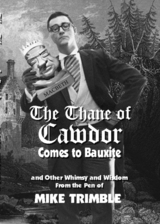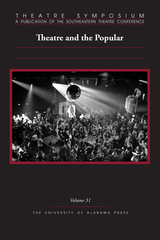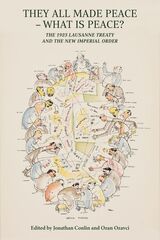136 scholarly books by Dartmouth College Press and 14
start with A
136 scholarly books by Dartmouth College Press and 14
136 scholarly books by Dartmouth College Press
14 start with A start with A
14 start with A start with A
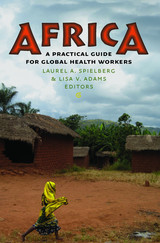
Africa
A Practical Guide for Global Health Workers
Edited by Laurel A. Spielberg and Lisa V. Adams
Dartmouth College Press, 2011
Written by authors who speak directly from their years of personal and professional experience with health projects in Africa, this book provides an integrated historical, social, political, economic, and health introduction to a series of African countries. It also offers a comprehensive view of major health issues for those aiming to undertake humanitarian and global health work in Africa. In the introductory chapter, the editors discuss the concepts of globalism and humanitarianism, and provide a framework for thinking about global health. They introduce readers to significant aspects of African history and agencies that play major roles in global health work in Africa. The “Tips for Travelers to Africa” chapter provides a wealth of information on preparing for travel to Africa and working successfully and effectively in African cultures. Individual chapters on Botswana, Ghana, The Maghreb, Rwanda, South Africa, Tanzania, and Uganda focus on key health or environmental issues, projects, and solutions unique to each country. Written jointly by U.S. and African medical personnel participating in major health initiatives, the chapters offer vibrant accounts of work on leading causes of disease and death or environmental problems.
[more]
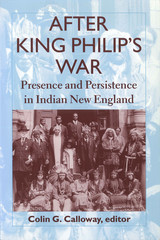
After King Philip’s War
Presence and Persistence in Indian New England
Edited by Colin G. Calloway
Dartmouth College Press, 1997
The 1676 killing of Metacomet, the tribal leader dubbed "King Philip" by colonists, is commonly seen as a watershed event, marking the end of a bloody war, dissolution of Indian society in New England, and even the disappearance of Native peoples from the region. This collection challenges that assumption, showing that Indians adapted and survived, existing quietly on the fringes of Yankee society, less visible than before but nonetheless retaining a distinct identity and heritage. While confinement on tiny reservations, subjection to increasing state regulation, enforced abandonment of traditional dress and means of support, and racist policies did cause dramatic changes, Natives nonetheless managed to maintain their Indianness through customs, kinship, and community.
[more]
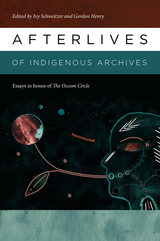
Afterlives of Indigenous Archives
Edited by Ivy Schweitzer and Gordon Henry
Dartmouth College Press, 2019
Afterlives of Indigenous Archives offers a compelling critique of Western archives and their use in the development of “digital humanities.” The essays collected here present the work of an international and interdisciplinary group of indigenous scholars; researchers in the field of indigenous studies and early American studies; and librarians, curators, activists, and storytellers. The contributors examine various digital projects and outline their relevance to the lives and interests of tribal people and communities, along with the transformative power that access to online materials affords. The authors aim to empower native people to re-envision the Western archive as a site of community-based practices for cultural preservation, one that can offer indigenous perspectives and new technological applications for the imaginative reconstruction of the tribal past, the repatriation of the tribal memories, and a powerful vision for an indigenous future. This important and timely collection will appeal to archivists and indigenous studies scholars alike.
[more]
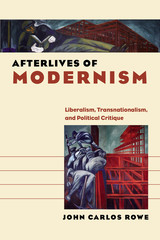
Afterlives of Modernism
Liberalism, Transnationalism, and Political Critique
John Carlos Rowe
Dartmouth College Press, 2015
In times of liberal despair it helps to have someone like John Carlos Rowe put things into perspective, in this case, with a collection of essays that asks the question, “Must we throw out liberalism’s successes with the neoliberal bathwater?” Rowe first lays out a genealogy of early twentieth-century modernists, such as Gertrude Stein, John Dos Passos, William Faulkner, and Ralph Ellison, with an eye toward stressing their transnationally engaged liberalism and their efforts to introduce into the literary avant-garde the concerns of politically marginalized groups, whether defined by race, class, or gender. The second part of the volume includes essays on the works of Harper Lee, Thomas Berger, Louise Erdrich, and Philip Roth, emphasizing the continuity of efforts to represent domestic political and social concerns. While critical of the increasingly conservative tone of the neoliberalism of the past quarter-century, Rowe rescues the value of liberalism’s sympathetic and socially engaged intent, even as he criticizes modern liberalism’s inability to work transnationally.
[more]

Against Immediacy
Video Art and Media Populism
William Kaizen
Dartmouth College Press, 2016
Against Immediacy is a history of early video art considered in relation to television in the United States during the 1960s and 1970s. It examines how artists questioned the ways in which “the people” were ideologically figured by the commercial mass media. During this time, artists and organizations including Nam June Paik, Juan Downey, and the Women’s Video News Service challenged the existing limits of the one-to-many model of televisual broadcasting while simultaneously constructing more democratic, bottom-up models in which the people mediated themselves. Operating at the intersection between art history and media studies, Against Immediacy connects early video art and the rise of the media screen in gallery-based art to discussions about participation and the activation of the spectator in art and electronic media, moving from video art as an early form of democratic media practice to its canonization as a form of high art.
[more]
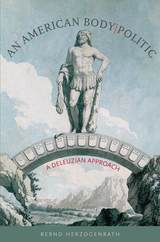
An American Body | Politic
A Deleuzian Approach
Bernd Herzogenrath
Dartmouth College Press, 2010
Bernd Herzogenrath’s An American Body|Politic is a study of the intersection between the material, biological body and body as political and cultural metaphor in American politics, religion, literature, and popular culture. Deeply influenced by the thought of Gilles Deleuze, Herzogenrath’s approach to American culture encompasses endless possibilities and potentials, eschewing the mechanic and structural. He traipses through American history and culture, pausing to examine such varied facets as the Puritans’ “two bodies,” Anne Hutchinson and the Antinomian Controversy, Cotton Mather and smallpox, the poetics|politics of Whitman, Henry Adams’s stroll along the shores of complexity, and the Detroit-based techno music of today.
[more]

American Paper Mills, 1690–1832
A Directory of the Paper Trade with Notes on Products, Watermarks, Distribution Methods, and Manufacturing Techniques
John Bidwell
Dartmouth College Press, 2013
Unprecedented in size and scope, this directory describes more than 500 paper mills on the basis of census records, archival sources, local histories, and watermark evidence. It traces economic developments and technological changes in the American paper trade from the colonial period to the industrial era, with special reference to its close connections with the printing business, which depended on local sources of supply for newsprint, book paper, and plate paper for engraved illustrations. Newly discovered and reattributed watermarks make it possible to identify these products and provide a more reliable means of dating and localizing works on paper. This fully documented survey of paper mills also contains biographical information about members of the trade and a succinct history of papermaking in America with essays on manufacturing methods, mechanization, business practices, and distribution networks. Among the illustrations in this volume are hitherto unrecorded woodcut and engraved views of manufactories, used in the packaging art of that period.
[more]
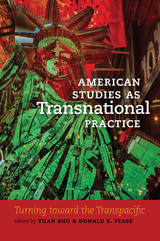
American Studies as Transnational Practice
Turning toward the Transpacific
Edited by Yuan Shu and Donald E. Pease
Dartmouth College Press, 2016
This wide-ranging collection brings together an eclectic group of scholars to reflect upon the transnational configurations of the field of American studies and how these have affected its localizations, epistemological perspectives, ecological imaginaries, and politics of translation. The volume elaborates on the causes of the transnational paradigm shift in American studies and describes the material changes that this new paradigm has effected during the past two decades. The contributors hail from a variety of postcolonial, transoceanic, hemispheric, and post-national positions and sensibilities, enabling them to theorize a “crossroads of cultures” explanation of transnational American studies that moves beyond the multicultural studies model. Offering a rich and rewarding mix of essays and case studies, this collection will satisfy a broad range of students and scholars.
[more]
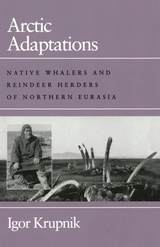
Arctic Adaptations
Native Whalers and Reindeer Herders of Northern Eurasia
Igor Krupnik
Dartmouth College Press, 2002
The common view of indigenous Arctic cultures, even among scholarly observers, has long been one of communities continually in ecological harmony with their natural environment. In Arctic Adaptations, Igor Krupnik dismisses the textbook notion of traditional societies as static. Using information from years of field research, interviews with native Siberians, and archaeological site visits, Krupnik demonstrates that these societies are characterized not by stability but by dynamism and significant evolutionary breaks. Their apparent state of ecological harmony is, in fact, a conscious survival strategy resulting from "a prolonged and therefore successful process of human adaptation in one of the most extreme inhabited environments in the world." As their physical and cultural environment has changed—fluctuating reindeer and caribou herds, unpredictable weather patterns, introduction of firearms and better seacraft—Arctic communities have adapted by developing distinctive subsistence practices, social structures, and ethics regarding utilization of natural resources. Krupnik's pioneering work represents a dynamic marriage of ethnography and ecology, and makes accessible to Western scholars crucial findings and archival data previously unavailable because of political and language barriers.
[more]

Arctic Politics
Conflict and Cooperation in the Circumpolar North
Oran R. Young
Dartmouth College Press, 1992
Long recognized by naturalists and adventurers as a dramatically unique region, the Arctic has recently emerged as an area of increasing political, strategic, and economic importance. The Arctic is both one of the world’s largest and smallest regions, encompassing 15% of the earth’s land mass, yet inhabited by fewer than 1% of the world’s population. Its physical vastness is coupled with a wealth of natural resources; in oil alone, the Far North contributes that majority of Russia’s production and 25% of US output. At the same time, the Circumpolar North is home to diverse indigenous peoples and cultures, thus setting the stage for conflicts of international scope. In this collection of essays, Oran Young provides a foundation for studying the politics of the Arctic as a distinctive international region. Expanding the traditional approach to area studies, he examines the Far North not only for its unique features, but also as an arena within which to develop new approaches to various issues of worldwide interest. Young challenges persistent stereotypes that marginalize the region, moving beyond the romanticism of many observers to arrive at an understanding of the complex social and ecological systems of the Far North. In doing so, Young thoughtfully establishes the Arctic as an area of international importance both in its own right and in relation to other geopolitical regions.
[more]

Arctic Wars, Animal Rights, Endangered Peoples
Finn. Lynge
Dartmouth College Press, 2002
Arctic Wars, Animal Rights, Endangered Peoples
[more]
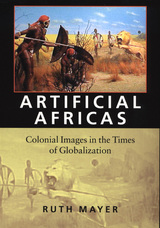
Artificial Africas
Colonial Images in the Times of Globalization
Ruth Mayer
Dartmouth College Press, 2002
“Africa is an artificial entity,” notes Ruth Mayer, “invented and conceived by colonialism.” In this wide-ranging study, Mayer explores the ways in which Western, and especially American, popular culture has manufactured and deployed various images of “Africa,” and how those changing constructions have reflected Western social and political concerns from the era of colonialism to the age of globalization. Mayer mines an enormous array of sources to expose the diverse images and narrative strategies that have been prominent in Western representations of Africa. She ranges authoritatively from King Solomon’s Mines and Tarzan to Khartoum and Greystoke, from Conrad’s Heart of Darkness to Nicholas Roeg’s film version, from Isak Dinesen and Ernest Hemingway to Ishmael Reed and Charles Johnson, from comic books to hip hop acts. In the process, she shows how seemingly stable cultural stereotypes have actually been transformed to reflect changing attitudes, conditions, and fears in the West, “adjusting the symbolic repertory of yesterday to the conceptual and ideological frameworks of today.” Dividing her work into “African Adventures” and “Alternative Africas,” Mayer not only restores an international context to American cultural history, but also shows the ways in which these images have functioned within both white and African American communities. With a deft command of both cultural source materials and current debates, Mayer explores the complex and powerful roles these “artificial Africas” have played in Western culture.
[more]
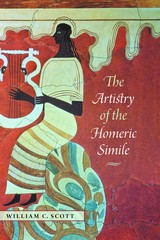
The Artistry of the Homeric Simile
William C. Scott
Dartmouth College Press, 2009
The similes in Homer are treasure troves. They describe scenes of Greek life that are not presented in their simplest form anywhere else: landscapes and seascapes, storms and calm weather, fighting among animals, civic disputes, athletic contests, horse races, community entertainment, women involved in their daily tasks, men running their farms and orchards. These basic paratactic additions to the narrative show how the Greeks found and developed parallels between two scenes—each of which elucidated and interpreted the other—then expressed those scenes in effective poetic language. In The Artistry of the Homeric Simile, Scott explores the variations and modifications that Homer employs in order to make similes blend expressively with the larger context. This engaging study will help unlock the richness of Homer for the modern reader.
[more]
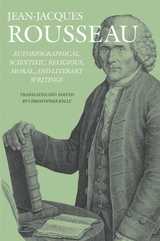
Autobiographical, Scientific, Religious, Moral, and Literary Writings
Jean Rousseau
Dartmouth College Press, 2014
Newcomers to Rousseau’s works and those who are familiar with his writings will find something to surprise them both in this wide variety of short pieces from every period of his life. Among the important theoretical writings found here are the “Fiction or Allegorical Fragment on Revelation” and the “Moral Letters,” which are among Rousseau’s clearest statements about the nature and limits of philosophic reasoning. In the early “Idea of a Method for the Composition of a Book,” Rousseau lays out in advance his understanding of how to present his ideas to the public. He ponders the possibilities for and consequences of air travel in “The New Daedalus.” This volume also contains both his first and last autobiographical statements. Some of these writings show Rousseau’s lesser-known playful side. A comic fairy tale, “Queen Whimsical”, explores the consequences—both serious and ridiculous—for a kingdom when the male heir to the throne, endowed with the frivolous characteristics of his mother, has a sister with all the characteristics of a good monarch. When Rousseau was asked whether a fifty-year old man could write love letters to a young woman without appearing ridiculous, he responded with “Letters to Sophie,” which attempt to demonstrate that such a man could write as many as four—but not as many as six—letters before he became a laughingstock. In “The Banterer,” he challenges readers to guess whether the work they are reading was written by an author who is “wisely mad” or by one who is “madly wise.” When Rousseau was challenged to write a merry tale, “without intrigue, without love, without marriage, and without lewdness,” he produced a work considered too daring to be published in France.
[more]
READERS
Browse our collection.
PUBLISHERS
See BiblioVault's publisher services.
STUDENT SERVICES
Files for college accessibility offices.
UChicago Accessibility Resources
home | accessibility | search | about | contact us
BiblioVault ® 2001 - 2024
The University of Chicago Press


